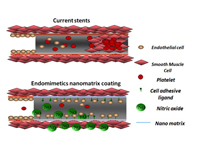The long-term performance of medical implant devices, like heart valves and cardiac stents, could be enhanced substantially by new bio-coating technology recently licensed to UAB spin-out company Endomimetics LLC through the UAB Research Foundation.
 The patent-pending technology is a novel bio-nanomatrix coating, or a bio-engineered material on the nano scale, that mimics natural endothelium, the substance that lines blood vessels. This biocompatibility — the ability to promote the body's acceptance of a implant device — can help prevent post-operative tissue scarring that sometimes leads to thrombosis, or blood-flow blockage, among the reported 10 million people who receive implants annually.
The patent-pending technology is a novel bio-nanomatrix coating, or a bio-engineered material on the nano scale, that mimics natural endothelium, the substance that lines blood vessels. This biocompatibility — the ability to promote the body's acceptance of a implant device — can help prevent post-operative tissue scarring that sometimes leads to thrombosis, or blood-flow blockage, among the reported 10 million people who receive implants annually.
"By mimicking natural endothelium, the nanomatrix coating essentially transforms injured blood vessels to a healthy condition at implant sites, and it has great potential for many applications," says Ho-Wook Jun, Ph.D., co-inventor of the technology and UAB assistant professor of biomedical engineering.
"Implanted devices, such as stents, prosthetic heart valves, vascular grafts and indwelling catheters have revolutionized patient care," says co-inventor Brigitta Brott, M.D., a UAB associate professor of medicine. "By improving the body's acceptance of these devices to reduce blood-clot formation and scar-tissue growth, we will greatly improve the quality of life for patients and also potentially drive down health-care costs by reducing the need for follow-up procedures."
Brott says U.S. heath-care costs connected to repeat procedures necessitated by clots and blood-flow blockage is estimated at more than $65 million each year.
The bio-nanomatrix, developed with other interdisciplinary researchers from the UAB schools of Medicine and Engineering, has been licensed by the UAB Research Foundation to Endomimetics LLC, the UAB spin-out founded by Jun and Brott. The UAB bio-nanomatrix is the only such coating of its kind, though some similar products are in the development pipeline.
"The UAB Research Foundation is excited to once again have played a key role in the development of a new company with a new and exciting technology that should fill a key need in a multi-billion dollar industry in a way no other product currently available in the marketplace has been able to do," says David Winwood, Ph.D., CEO of the UAB Research Foundation.
